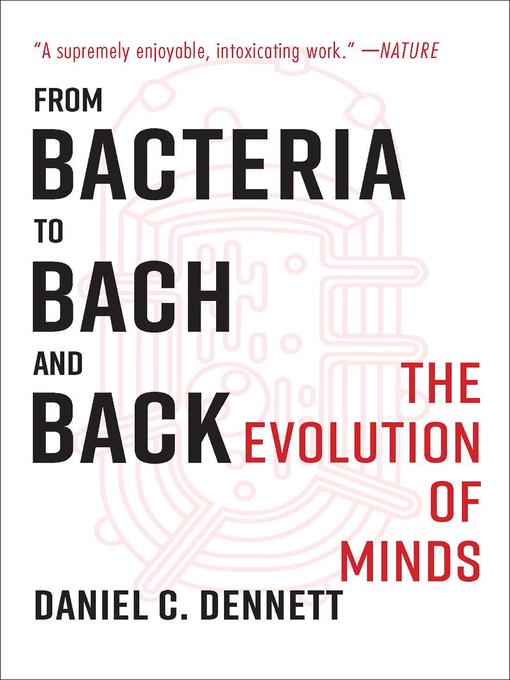
From Bacteria to Bach and Back
The Evolution of Minds
کتاب های مرتبط
- اطلاعات
- نقد و بررسی
- دیدگاه کاربران
نقد و بررسی

November 14, 2016
Dennett (Intuition Pumps and Other Tools for Thinking), co-director of the Center for Cognitive Studies at Tufts University, combines arguments from philosophy, biology, and informatics to explore questions associated with the origin of consciousness. It is an illuminating and insightful, if occasionally difficult, book; Dennett’s two overarching themes concern the philosophical ideas of René Descartes and the biological concepts of Charles Darwin. As he has done before, Dennett argues that Cartesian mind/body dualism, which is still accepted by many today, is incorrect. He makes a convincing case, based on a rapidly growing body of experimental evidence, that a materialist theory of mind is within reach. Dennett also builds on Darwin’s idea of natural selection, explaining how natural systems can create “competence without comprehension”—that is, situations in which sophisticated actions occur without the individual or machine involved understanding the reasons for the actions taken. This type of “bottom-up” design, according to Dennett, can lead to innovative results, including animal brains. He takes the next step to propose that basic language acquisition ability is coupled with the memes of language to yield both consciousness and culture. Though Dennett is sure to once again raise the hackles of certain peers, his ideas demand serious consideration.

December 15, 2016
The dean of consciousness-raising consciousness-explaining returns with another cleareyed exploration of the mind. "How come there are minds?" asks Dennett (Philosophy and Cognitive Science/Tufts Univ.; Intuition Pumps and Other Tools for Thinking, 2013, etc.), both beguilingly and with just a hint of a challenge. The human brain is both top-down and bottom-up, the latter reflecting automatic, animal impulses, the former the better angels of our nature. How did that top-down control system grow to dominate, producing what we think of as not just brain, but mind? Therein lies a tangled story with many threads, some of which lead into daunting territory: the thought, for instance, that consciousness is really a species of illusion on the part of the "user." After a few hundred pages' tour of an evolutionary theater populated by mirages, "feral neurons," and words that struggle to reproduce and thrive just as living creatures do, such a possibility comes to seem not so strange after all. Dennett defends the human mind as the chief feature distinguishing our kind from other animals; after all, he notes, we are aware of bacteria, whereas other animals are not, and "even bacteria don't know that there are bacteria." Yet that knowledge comes at a formidable cost, and when the author enters into the territory of inversions of reasoning and of reasoning about reasoning, of "the evolution of the evolution of culture" and other seeming circularities, you know that you're in for a bumpy ride: "There are reasons why trees spread their branches, but they are not in any strong sense the trees' reasons." The ride may be bumpy for casual readers, but it's always interesting, as Dennett calls on the likes of Darwin, Descartes, and Gibson--the last the author of a fruitful theory of "affordances"--to explore how we represent and understand representations. Anyone interested in modern theories of the mind and consciousness has to reckon with Dennett. This book, dense but accessible, is as good a place as any to start.
COPYRIGHT(2016) Kirkus Reviews, ALL RIGHTS RESERVED.

September 15, 2016
Austin B. Fletcher Professor of Philosophy at Tufts University, Dennett considers the how and the why of consciousness by looking not only at evolution and neuroscience but at human culture itself, showing that it affords our brains a range of thinking tools, or memes, that are the rich building blocks of language. Thus does culture facilitate reflection, which in turn facilitates cultural evolution. A major TED talker.
Copyright 2016 Library Journal, LLC Used with permission.

Starred review from December 1, 2016
For five decades, Dennett (cognitive studies, Tufts Univ.; Darwin's Dangerous Idea; Consciousness Explained) has been writing about the implications of Darwinian evolution, the origin of language, and the evolution of the human mind. His main objective here is to show that humans are different from all other species, primarily because memes--in the form of words--transformed our brains into minds. (The term meme was originally coined by Richard Dawkins in The Selfish Gene and refers to a unit of culturally transmitted information.) Drawing upon research and concepts from the fields of computer science, neuroscience, cognitive science, artificial intelligence, evolutionary biology, theoretical linguistics, and information science, Dennett brilliantly uses analogy, metaphor, and counterintuitive reasoning to construct his arguments. VERDICT This sweeping examination of biological and cultural evolution as seen through a philosopher's lens is highly recommended for academics as well as nonspecialists who enjoy Dawkins, Steven Pinker, and Douglas Hofstadter.--Cynthia Lee Knight, Hunterdon Cty. Historical Soc., Flemington, NJ
Copyright 2016 Library Journal, LLC Used with permission.

December 1, 2016
For five decades, Dennett (cognitive studies, Tufts Univ.; Darwin's Dangerous Idea; Consciousness Explained) has been writing about the implications of Darwinian evolution, the origin of language, and the evolution of the human mind. His main objective here is to show that humans are different from all other species, primarily because memes--in the form of words--transformed our brains into minds. (The term meme was originally coined by Richard Dawkins in The Selfish Gene and refers to a unit of culturally transmitted information.) Drawing upon research and concepts from the fields of computer science, neuroscience, cognitive science, artificial intelligence, evolutionary biology, theoretical linguistics, and information science, Dennett brilliantly uses analogy, metaphor, and counterintuitive reasoning to construct his arguments. VERDICT This sweeping examination of biological and cultural evolution as seen through a philosopher's lens is highly recommended for academics as well as nonspecialists who enjoy Dawkins, Steven Pinker, and Douglas Hofstadter.--Cynthia Lee Knight, Hunterdon Cty. Historical Soc., Flemington, NJ
Copyright 2016 Library Journal, LLC Used with permission.

























دیدگاه کاربران